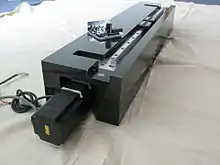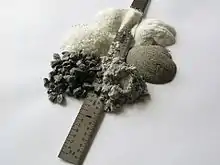Epoxy granite
Epoxy granite, also known as synthetic granite,[1] is a polymer matrix composite and is a mixture of epoxy and granite commonly used as an alternative material for machine tool bases. Epoxy granite is used instead of cast iron and steel for improved vibration damping, longer tool life, and lower assembly cost, and thus better properties for stabilizing and housing machines.[2][3]

Machine tool base
Machine tools and other high-precision machines rely upon high stiffness, long-term stability, and excellent damping characteristics of the base material for their static and dynamic performance. The most widely used materials for these structures are cast iron, welded steel fabrications, and natural granite. Due to the lack of long-term stability and very poor damping properties, steel fabricated structures are seldom used where high precision is required. Good-quality cast iron that is stress-relieved and annealed will give the structure dimensional stability, and can be cast into complex shapes, but needs an expensive machining process to form precision surfaces after casting. Natural granite has a higher damping capacity than cast iron, but similarly to cast iron can be labor-intensive and expensive to machine and finish. The traditional market for epoxy granite is to replace iron and steel in these applications.[4]
Process

Precision granite castings are produced by mixing granite aggregates (which are crushed, washed, and dried) with an epoxy resin system at ambient temperature (i.e., cold curing process). Quartz aggregate filler can also be used in the composition. Vibratory compaction during the molding process tightly packs the aggregate together. Mechanical and thermo-mechanical properties can be improved further if fiber is used as well as the granite.[5][6] Other resins in addition to the epoxy may also be used instead of fibers to improve properties such as water absorption.[7] If porosity is controlled, damping effects can be improved further.[8] Threaded inserts, steel plates, and coolant pipes can be cast-in during the casting process. To achieve an even higher degree of versatility, linear rails, ground slide-ways, and motor mounts can be replicated or grouted-in, therefore eliminating the need for any post-cast machining.
Other definitions
Epoxy resins and granite, specifically waste granite dust, may be used in other applications such as floor coatings. Waste granite filings are produced in the mining industry, and the low density means this can be easily dispersed by winds and thus distributed in the environment. Research is being done on innovative solutions such as using waste granite powders in epoxy resins and designing binders for coatings based on this.[9]
Advantages over iron and its alloys
The vibration damping of epoxy granite is often claimed to be superior to that of steel or cast iron [10] It is also well known that iron and steel and alloys corrode or rust, whereas epoxy is often used to prevent corrosion. So, the corrosion and general chemical resistance of epoxy granite to most common solvents, acids, alkalis, and cutting fluids is superior to steel and alloys and does not require constant painting.[11] Epoxy granite material has an internal damping factor up to ten times better than cast iron, up to three times better than natural granite, and up to thirty times better than steel fabricated structure.[12] The method of casting compared to steel allows easier inclusion of inserts etc. and thus reduced machining of the finished casting and reduced assembly time by incorporating multiple components into one casting.[13] Polymer cast resins use very little energy to produce, and the casting process is done at room temperature.[14]
References
- McKeown, P.; Morgan, G. (1979). "Epoxy granite: a structural material for precision machines". Precision Engineering. 1 (4): 227. doi:10.1016/0141-6359(79)90104-1.
- Kamath, Sandesh; D'Mello, Joel; Balakrishna, S S (October 2014). "EXPERIMENTAL STUDY ON MECHANICAL PROPERTIES OF RED GRANITE-EPOXY PARTICULATE COMPOSITES" (PDF). International Journal of Mechanical Engineering and Robotics Research. 3 (4). ISSN 2278-0149 – via IJMERR.
- Shanmugam, C; Thyla, P R; Kumar, N Mahindra; Rabik, S John; Krishna, R Ragav; Kumar, S Vivin (2017). "Experimental Studies on Mechanical Properties of Epoxy Granite for Machine Tool Structure using Design of Experiments". Asian Journal of Research in Social Sciences and Humanities. 7 (3): 1333. doi:10.5958/2249-7315.2017.00246.5. ISSN 2249-7315.
- Venugopal, Prabhu Raja; Dhanabal, P; Thyla, Pr; Mohanraj, S; Nataraj, Mahendrakumar; Ramu, M; Sonawane, Harshad (March 2020). "Design and analysis of epoxy granite vertical machining centre base for improved static and dynamic characteristics". Proceedings of the Institution of Mechanical Engineers, Part L: Journal of Materials: Design and Applications. 234 (3): 481–495. doi:10.1177/1464420719890892. ISSN 1464-4207.
- Pawar, M. J.; Patnaik, Amar; Nagar, Ravindra (April 2017). "Investigation on mechanical and thermo-mechanical properties of granite powder filled treated jute fiber reinforced epoxy composite". Polymer Composites. 38 (4): 736–748. doi:10.1002/pc.23633.
- Gonçalves, Jorge Antônio Vieira; Campos, Diego Adalberto Teles; Oliveira, Gislane de Jesus; Rosa, Maria de Lourdes da Silva; Macêdo, Marcelo Andrade (August 2014). "Mechanical properties of epoxy resin based on granite stone powder from the Sergipe fold-and-thrust belt composites". Materials Research. 17: 878–887. doi:10.1590/S1516-14392014005000100. ISSN 1516-1439.
- Ramakrishna, H. V.; Rai, S. K. (January 2006). "Effect on the Mechanical Properties and Water Absorption of Granite Powder Composites on Toughening Epoxy with Unsaturated Polyester and Unsaturated Polyester with Epoxy Resin". Journal of Reinforced Plastics and Composites. 25 (1): 17–32. doi:10.1177/0731684406055450. ISSN 0731-6844.
- Nallusamy, S.; Narayanan, M. Rajaram; Sujatha, K.; Rekha, R. Suganthini (2021). "Experimental Investigation of Mechanical Properties and Effect of Porosity on Epoxy Granite Composite". Materials Science Forum. 1042: 123–129. doi:10.4028/www.scientific.net/MSF.1042.123. ISSN 1662-9752.
- Kampa, Łukasz; Chowaniec, Agnieszka; Królicka, Aleksandra; Sadowski, Łukasz (2022-09-01). "Adhesive properties of an epoxy resin bonding agent modified with waste granite powder". Journal of Coatings Technology and Research. 19 (5): 1303–1316. doi:10.1007/s11998-022-00620-2. ISSN 1935-3804.
- Ubale, Deepak (2021). "Stiffness and Damping of Epoxy Granite". International Journal of Engineering and Advanced Technology. 9.
- "Steel corrosion". www.corrosion-doctors.org. Retrieved 2022-10-25.
- McKeown, P. A.; Morgan, G. H. (1979-10-01). "Epoxy granite: a structural material for precision machines". Precision Engineering. 1 (4): 227–229. doi:10.1016/0141-6359(79)90104-1. ISSN 0141-6359.
- ArunRamnath, R; Thyla, P R (2022-06-01). "Measurement and optimization of multi-attribute characteristics in milling epoxy granite composites using rsm and combined ahp-topsis". Surface Topography: Metrology and Properties. 10 (2): 025023. doi:10.1088/2051-672X/ac4566. ISSN 2051-672X.
- Ghorbani, Siamak; Crisostomo, Alejandro Veliz Aguayo; Rogov, Vladimir Aleksandrovich; Polushin, Nikolay Ivanovich (2018-01-01). "Experimental and theoretical research on drilling epoxy granite using coated and uncoated carbide spiral drill bits". International Journal of Mechanical Sciences. 135: 240–252. doi:10.1016/j.ijmecsci.2017.11.025. ISSN 0020-7403.
Further reading
- Terry Capuano. "Polymer Castings take on metals". Machine Design 2006.
- COMPOSITE MATERIALS:ENGINEERING AND SCIENCE Mathews, F. L; Rawlings, Reese. COMPOSITE MATERIALS: ENGINEERING AND SCIENCE (1st ed.). CHAPMAN & HALL. ISBN 9780412559709.